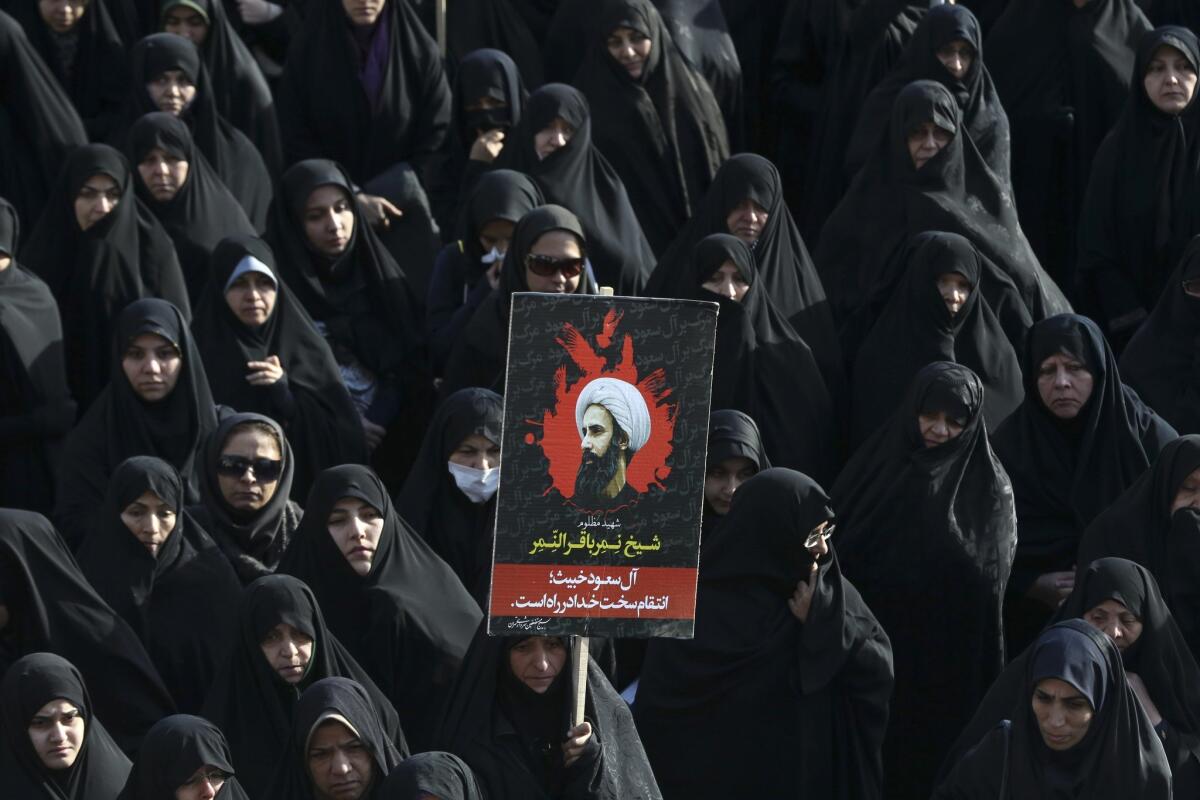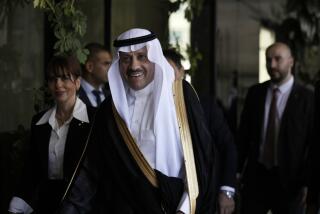Mideast rift widens as Saudi allies cut ties with Iran

An Iranian woman in Tehran on Monday holds up a poster showing Sheikh Nimr Al-Nimr, a prominent opposition Saudi Shiite cleric who was executed last week by Saudi Arabia.
Reporting from Dubai, United Arab Emirates — Bahrain and Sudan severed diplomatic ties with Iran on Monday in an apparent act of solidarity with Saudi Arabia, further ratcheting up regional tensions following the kingdom’s execution of a prominent Shiite cleric.
They were joined by the United Arab Emirates, which reduced its diplomatic representation in Iran to the attache level.
For a second day, Saudi Arabia continued a diplomatic onslaught against its regional nemesis, announcing it would prevent its citizens from traveling to Iran, suspend flights between the two countries and cease all commercial trade, according to a statement by Saudi Foreign Minister Adel al-Jubeir to the Reuters news agency.
Iranians coming to Saudi Arabia for the annual Hajj pilgrimage in the holy city of Mecca, however, would still be welcome, he added.
Sheikh Nimr Al-Nimr, a dissident sheikh from Saudi Arabia’s restive eastern province, was put to death Saturday as part of a mass execution of what were mostly Al Qaeda extremists.
Nimr’s death sparked a wave of outrage, especially in Iran, where protesters lobbed Molotov cocktails and stormed the Saudi Embassy in Tehran early Sunday before being stopped by police.
Join the conversation on Facebook >>
Although Iranian President Hassan Rouhani quickly condemned the violence, and subsequent protests were held under heavy police supervision, Riyadh insisted that the Iranian government had turned a blind eye to the protesters and allowed the attack to happen.
That prompted Saudi authorities to announce Sunday that they were severing diplomatic ties with Iran, and the Saudi allies followed suit.
Bahrain, whose Sunni rulers accuse Iran of fomenting dissent among the country’s Shiite-dominated population, declared it would cut off all diplomatic relations due to the “worsening of the blatant and dangerous intervention” by Iran in the affairs of Bahrain and other Arab states. The announcement came in a statement by the country’s Foreign Ministry.
It added that Iran’s behavior “confirmed a determination to spread devastation and destruction, and provoke unrest and strife in the region by providing protection and support for terrorists and extremists.”
NEWSLETTER: Get the day’s top headlines from Times Editor Davan Maharaj >>
The move followed an edict by Bahrain’s interior ministry threatening action against “anyone attempting to use the recent verdicts in Saudi Arabia to heighten sectarian tensions or to incite violence.”
Sudan followed, declaring an immediate cessation of all diplomatic activity in an effort to counter “Iranian plans” in the area, according to a report by the official Sudanese news agency, SUNA.
The United Arab Emirates, a regional economic powerhouse and Iran’s fourth largest trading partner, according to local media, recalled its ambassador from Iran, leaving its charge d’affaires as its top diplomat in the country, according to a ministry statement.
‘’This exceptional step has been taken in the light of Iran’s continuous interference in the internal affairs of Gulf and Arab states, which has reached unprecedented levels,’’ the statement said, adding that “positive and natural relations between states should be based on mutual respect for the sovereignty of states and the adoption of a policy of non-interference in the internal affairs of others.”
Business relations, however, would continue, the UAE said.
Last year, the lifting of economic sanctions on Iran was expected to be a boon for business with the Emirates.
In a press conference on Monday, Iranian First Vice President Eshaq Jahangiri said that Saudi Arabia, not Iran, would be the one to suffer from the cutting of diplomatic ties.
“I advise the Saudi leaders to stop these subversive, hasty, illogical, emotional acts that are marked by mismanagement,” said Jahangiri, according to a transcript provided by Iranian media outlet Press TV.
He also counseled the Saudis to emulate Tehran’s behavior and exercise restraint in the face of Saudi Arabia’s destructive regional policies.
“You too should learn this [kind of] behavior,” he added.
Iranian Foreign Ministry spokesman Hossein Jaberi Ansari, in his weekly press briefing in Tehran on Monday, accused the Saudi government of using the tensions “to settle its domestic problems through blame games.”
Despite the ramped-up tensions between the two countries, observers did not expect hostilities to escalate to warfare between Saudi Arabia and Iran.
“I don’t believe [Nimr’s death] will be a make-or-break issue for open war,” said Professor Joas Wagemakers, an expert on Sunni-Shiite relations at Utrecht University.
“Nimr was not openly connected nor overly loyal to Iran, and he did not believe an Islamic state along Iranian lines should be founded in Saudi Arabia,” he added.
Wagemakers added that the anger and frustration in Iran was based more on religious concerns, since Nimr represented Saudi Arabia’s Shiite minority, than political ones.
“Nimr’s death is seen as that of a man who was killed for his principles and for his cause,” Wagemakers said. “He was a spokesman for the despised.”
Special correspondent Bulos reported from Dubai and Mostaghim from Tehran.
ALSO
Israel indicts Jewish extremists in deadly arson attack
Video purports to show Islamic State fighters executing ‘British spies’
Protesters storm Saudi embassy in Iran after execution of popular Shiite cleric
More to Read
Sign up for Essential California
The most important California stories and recommendations in your inbox every morning.
You may occasionally receive promotional content from the Los Angeles Times.










